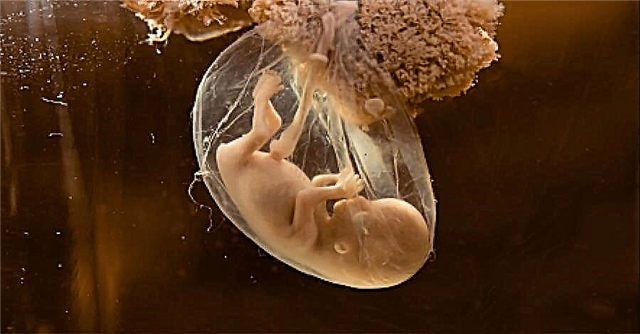A baby at three months is no longer the baby that was born: he has become larger in the last month from 500 grams and more, begins to sleep less, and is more awake. When a child eats little at 3 months, this is very disturbing for the parents. The baby can constantly scream and cry, it is bad to gain weight, so the mother quickly switches her child to artificial feeding, believing that the whole problem is a lack of breast milk. However, the baby may not have appetite for other reasons that cannot be solved at home, but require specialized treatment or even hospitalization.

Breastfeeding your baby
The importance of proper nutrition for a 3 month old baby
The child's body needs a complete and healthy diet. The most ideal option for an infant up to six months is mother's milk. However, it is not always possible to establish lactation, in some cases breastfeeding can be dangerous, both for the health of the mother and for the baby (taking medications that are not compatible with HV, hormonal failure in the mother).
Nutrition for a 3-month-old is one of his main occupations, his main goal and joy in life. If the crumb is malnourished, then with the help of a cry it demands a portion of food. The baby wakes up in the middle of the night from hunger, immediately greedily catches a breast nipple or a pacifier.
The baby must necessarily receive food at 3 months (milk or mixture) in order to fully develop, learn about the world around and gradually learn new skills.
Important! Dr. Komarovsky, a Russian pediatrician, recommends not to panic if a baby is eating poorly at 3 months. The doctor is convinced that the baby will not force himself to starve, and if he turns away from the breast or the bottle, it means that he has enough food that he has. Weight gain and number of peeps should be tracked. If they are within the normal range, then there is nothing to worry about.
Nutritional norms
It does not matter what type of feeding the baby is on (gw, willow or mixed), there is a certain norm in the number of feedings and the amount of food that the baby should receive.
Note! The third month is the period when the baby begins to grow actively, which means that his appetite increases. Often at this time, the mother has a lactation crisis, which she is frightened of and resorts to supplementary feeding or even the beginning of complementary feeding. This should never be done in a coma; you just need to apply it to the baby's chest more often.

Nutritional standards for children under one year old
For gv, babies at three months receive up to 900 ml of milk per day, divided into 6-7 feedings. On willows at a time, the baby is offered no more than 180 ml of the mixture, usually five meals a day.
What deviations are dangerous
Pediatricians recommend first of all to monitor the weight of the child and the number of peeps. If the baby began to lose weight within a week or two, then it is necessary to urgently contact a specialist who will send him for further examination.
For some, it is more convenient for a mother to track how much the baby urinates in order to recognize the presence of pathology. The number of pee-peers should not drop below 10.
Causes of poor appetite at 3 months
One of the most important reasons, which Komarovsky also repeatedly mentions, why a child at 3 months does not eat well, is to overfeed him. Because of this, the crumb may even specifically try to fall asleep early, even in the process of sucking on the mother's breast, or immediately deliberately turns the head away from the bottle.
Additional Information. Restless mothers can, at the first squeak, offer their breasts to the baby, without thinking whether the baby is screaming from hunger. Doctors consider this approach to be wrong, because this is how the child's wrong reaction to food is formed.
As a result, the baby perceives food as torture, grunts, sucks very sluggishly, and can immediately regurgitate. Maternal instinct always works towards feeding the baby, no matter what. He, as a rule, dominates not only mothers of first-borns, but also experienced women in this matter.
Important! If in doubt, and it seems that the baby is eating little, first of all, you should make sure that the child has a well-established regimen where there are breaks between feedings, healthy sleep and walks.
Physiological
From the point of view of physiology, the child eats little and reluctantly at 3 months for the reasons:
- Disease. Usually adults also lose their appetite, what to say about babies.
- Runny nose interferes. If the nose is blocked, then it is difficult for the baby to suck.
- Intestinal colic. As a rule, after three to five months, when the digestive system matures, this ailment disappears.

Intestinal colic in infants
- The process of teething has begun. Usually the first teeth appear in 5-6 months, the eruption period can last several months before the first incisor appears.
- Children's mood is also a reason for refusing to eat. The child may be out of sorts, have a headache, or dislike a toy or lighting. The issue is resolved after mom holds the baby in her arms, lovingly communicates with him, consoles and lulls him, if necessary.
- Don't like the taste of milk or mixture. A nursing mother needs to revise her diet: exclude spicy, spicy, garlic and marinades. Artificial mothers should change the brand of the mixture.
Note! Children have a very keen charm, so perhaps the reason lies in the sharp scent of the perfume that mom uses.
- The baby wants to drink, not eat. This is especially true for children on willows. It is worth trying to give water.
External
Sometimes the crumb refuses to eat due to external reasons:
- He is uncomfortable - wrong posture. It is important to familiarize yourself with all the convenient feeding positions, to find a comfortable one for a particular baby.
- Incorrect latching technique to the breast or bottle. With the latter, the issue is solved by replacing it with another, today their range is very large. With gv, you should study the technique of gripping the nipple of the breast, you can contact a breastfeeding consultant to resolve this issue.

How to apply to the chest
Additional Information. During the feeding process, the baby can defecate, so it will begin to feel severe discomfort. This is fraught with the fact that he will begin to swarm from unpleasant sensations, nervously capturing air, which will subsequently cause profuse regurgitation or colic. You should change the diaper, and then continue eating.
Pathological
Why did the baby begin to eat the formula poorly at 3 months old or began to refuse to breast? This can be caused by pathology:
- Tongue frenum too short. The issue is resolved quickly, but it is worth going to a specialist.
- Oral candidiasis or thrush. The baby is itching and burning, the feeding process brings discomfort and even pain.

Oral candidiasis in babies
- Hypertension or increased intracranial pressure.
- Otitis. It hurts the baby to swallow, so he tries to refuse feedings.
- Intestinal infection and rotavirus. It is important that the baby drank a lot of water so that dehydration does not occur.
What to do
What to do if a baby doesn't eat well at 3 months? Determine the cause of this behavior and try to eliminate it. If the crumb eats poorly, but at the same time is active, well awake, it means that he has enough food. Weight gain is also an indicator that the baby is developing correctly. If the toddler has a fever, he is lethargic and apathetic, it is worth calling a doctor and resorting to immediate treatment.
If the cause is colic, then dill water and other anti-colic drugs will help, and mom should also adjust her diet and get rid of bad habits.
Artificial feeding
In some cases, babies on willows have a poor appetite because they don't like the nipple of the bottle. If, after changing it, the baby refuses to eat again, then it is worth:
- Make sure there is no hunger. The mixture is more nutritious than milk. It is important to maintain the interval between feedings at least 3-4 hours.
- Change the type of mixture.
- Check the temperature of the food, it should be equal to the temperature of the human body.
- Eliminate too thick consistency of the mixture.
Breast-feeding
First of all, mom should take care of lactation and milk taste. For this:
- Apply to the breast more often if a lactation crisis occurs.
- Express after feeding if there is too much milk. If the breasts are tight and firm before breastfeeding, you should express a little before breastfeeding.
- Drink plenty of water (at least 2 liters).
- Drink special teas for lactation.
- Eliminate foods that change the taste of milk in your diet.
When to see a doctor
If the baby began to refuse food, then in the following cases it is necessary to urgently consult a doctor:
- The baby is losing weight, the fontanel is fused, the temperature has risen.
- The kid is constantly sleeping or, conversely, is awake more than expected.
- Stool has changed: diarrhea or constipation.
- The baby is constantly screaming, waving his hands, trying to touch his ear.
- There is a white coating in the mouth, or the throat is sore.
- Very profuse regurgitation, vomiting in a fountain.

During otitis media, babies are uncomfortable in a horizontal position
Adequate nutrition will help create strong immunity for your baby. If the baby is eating poorly, every effort must be made to establish this process and quickly resolve the problem.



